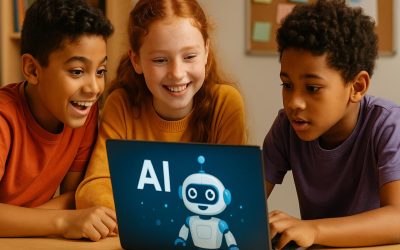Parenting is an ever-evolving journey, with new approaches and philosophies emerging constantly. As we move further into 2025, several notable trends are shaping how families raise their children. From the integration of artificial intelligence into daily routines to a renewed focus on community and financial literacy, these trends reflect a changing world and parents’ efforts to adapt. This article delves into some of the most significant parenting trends of 2025, examining their potential benefits and challenges.
The Rise of AI-Powered Parenting Tools
Artificial intelligence is no longer confined to science fiction; it’s becoming a practical tool for parents. AI-powered applications can assist with tasks like generating custom bedtime stories, managing schedules, and even answering children’s endless
questions [1]. While the convenience is undeniable, it raises questions about privacy and the potential for over-reliance on technology. The key is to use AI as a supportive tool, not a replacement for parental intuition and human interaction.
Community Parenting: The Modern Village
The adage “it takes a village to raise a child” is experiencing a resurgence in 2025 through the concept of community parenting. This trend involves families collaborating on childcare, homeschooling, and extracurricular activities. It offers both financial relief, especially with rising childcare costs, and emotional support. However, successful community parenting requires clear communication and established boundaries to navigate potential disagreements on matters like snack choices or screen time rules [1].
Financial Literacy for the Next Generation
In an increasingly complex economic world, parents are prioritizing financial literacy for their children at a young age. This goes beyond traditional piggy banks, incorporating gamified apps and interactive tools to teach saving, investing, and budgeting. The goal is to equip children with essential money management skills, fostering a generation of financially savvy adults [1].
Parenting for Climate Resilience
Climate change has become a significant topic within family conversations. Parents are actively teaching their children about environmental adaptation, including growing food, conserving resources, and preparing for extreme weather events. This trend extends to embracing zero-waste living, renewable energy, and home gardening, promoting sustainability and a deeper connection with nature. The challenge lies in making these concepts engaging and relevant for young minds [1].
The Return of Multigenerational Living
Driven by rising housing costs and the desire for built-in family support, multigenerational living is making a comeback. This involves extended family members, such as grandparents, living together under one roof. While it offers practical and economic benefits and fosters stronger intergenerational bonds, it also requires careful navigation of differing parenting styles, personal space, and household dynamics [1].
Q&A
Q: How is AI being used in parenting in 2025?
A: AI is being used to assist parents with tasks like generating custom bedtime stories, managing schedules, and answering children’s questions, offering convenience but also raising privacy concerns.
Q: What are the benefits of community parenting?
A: Community parenting offers financial relief due to shared childcare costs and provides emotional support through collaborative efforts in raising children.
Q: Why is financial literacy important for children in 2025?
A: With rising costs and a complex economic landscape, teaching children financial literacy early on equips them with essential money management skills for their future.
Sources
[1] Macaroni KID Burlington-Wilmington-Woburn-Winchester. (2025, January 6). 5 Parenting Trends That Will Rock Your World in 2025. https://burlingtonma.macaronikid.com/articles/674f7234679fd4559d2cccf8/5-parenting-trends-that-will-rock-your-world-in-2025








0 Comments